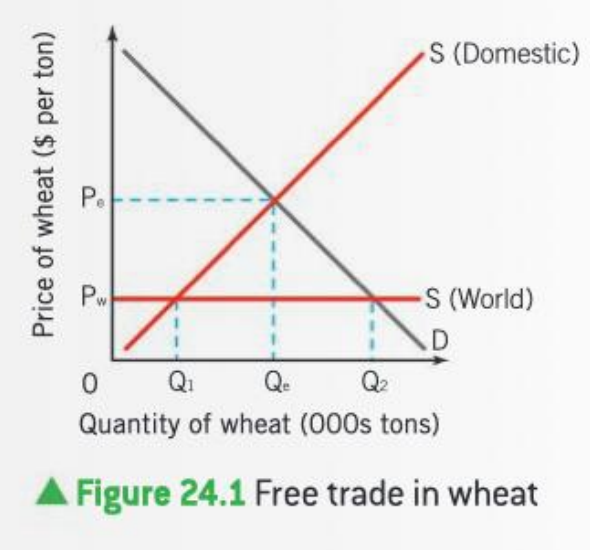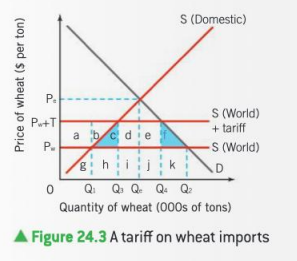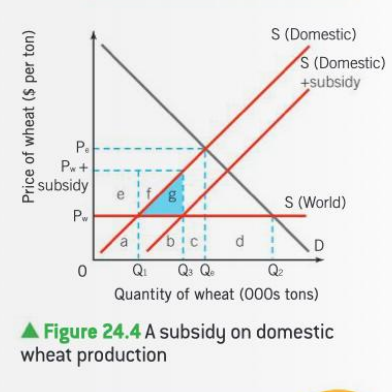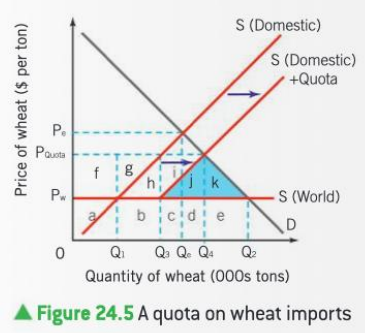economics test (free trade and protectionism)
1/18
Earn XP
Description and Tags
Name | Mastery | Learn | Test | Matching | Spaced | Call with Kai |
|---|
No analytics yet
Send a link to your students to track their progress
19 Terms
why do countries trade?
lower prices
greater choice
differences in resources
economies of scale
increased competition
more efficient allocation of resources
source of foreign exchange
absolute advantage
a country can produce a good using fewer resources than another country
comparative advantage
a country can produce a good at a lower opportunity cost than another country
when trade is not free?
sanctions /embargo/ - ban on trade with a country (ex. Russia)
tariffs - extra charge on buying goods from another country (by the gov)
quotas
subsidies
free trade
there are no barriers to trade put by the government or international organizations; g&s are allowed to move freely between countries
protectionism
measures that for various reasons limit the international trade
opposite of free trade

why is international supply perfectly elastic
we have much more producers (they are joint together)
theoretically we can have infinite supply from infinite numbers of producers
the world supply is much less limited
we can't draw it above the equilibrium, then the international price would be higher than the domestic (so it wouldn't be reasonable to buy foreign goods if you can have it cheaper domestically)
advantages of protectionism
PROTECTIONSM ALLOWS THE GOVERNMENTS TO:
protect domestic employment, when some industries are in a decline and let off workers, creating structural unemployment
protect the economy from low-cost jobs, ex. US wants to protect its domestic producers against cheap import from Asia
protect sunrise industries (industries that are in a decline) that cannot enjoy the economies of scale; they should be protected until they reach the size where they achieve the benefits
avoid over-specialization, where a country is highly dependent on exports of one or two products and therefore changes in the demand for that product will highly impact the economy
prevent dumping, which is selling large quantities of a good at a price lower than production costs, when for ex. EU has a surplus of butter; this can destroy the domestic market
raise their revenue, when they for ex. collect tariffs
disadvantages of protectionism
protectionism may raise prices of the imports
less choice for consumers
inefficient producers, less competition
specialization is reduced
trade war
protectionism may hinder economic growth
tariffs
a tariff is a tax charged on imported goods
shifts the word supply upwards, since it is placed on foreign consumers (they have to pay more)
as a result domestic producers increase production, so their revenue increase

subsidies
a subsidy is an amount of money paid by the government to a firm, per unit of output
subsidies make domestic producers more competitive
shift of domestic supply downwards by the amount of subsidy
domestic producers have more income

quotas
a physical limit on the number or value of goods that can be imported into a country
domestic producers raise their revenue

administrative barriers
red tape - any legal barriers or complications to trade
health and safety standards
embargoes - extreme quotas (complete ban on imports)
economic integration
a process whereby countries coordinate and link their trade and
(macro)economic policies
a bilateral trade agreement - trade between two countries
a multilateral trade agreement - trade between multiple countries
trading blocs + types
group of countries that join together in some form of agreement in order to increase trade between them and/or to gain economic benefits
preferential trading areas - gives access to certain product from certain countries; reduction, but not elimination of tariffs, ex. ACP (African, Caribbean, Pacific Group of States)
free-trade areas - countries agree to trade freely among themselves, but are able to trade outside also, ex. NAFTA (North American Free Trade Area)
customs union - the countries freely trade among themselves and adopt common external barriers against other countries, ex. East African Community
common markets - customs union with common policies on product regulation, free movements of goods, services, capital and labor, ex. CSME (CAPRICOM Single Market and Economy)
economic, monetary union - common market, common currency, common central bank, ex. Eurozone (countries with euro)
WTO
The WTO is an international organization that sets the rules for global trading and resolves disputes between iłs member countries
The WTO was established on 1 January 1995 and now, in April 2019, has 164 members and 23 observer countries, the majority of whom are seeking membership
"organization for liberalizing trade"
aims of WTO
- Non-discrimination >> countries should not discriminate between their own products, services, and nationals and those of foreign countries. They should also not discriminate between their trading partners.
- More open trade >> lowering trade barriers through negotiation is one of the most obvious ways of increasing trade. The barriers include tariffs, import bans and quotas.
- Predictability and transparency >> all economic stakeholders, including governments, firms and investors should be confident that trade barriers will not be raised, providing the confidence to invest, create jobs, increase consumer choice and lower prices.
- Encouraging "fair” competition >> through discouraging "unfair” practices. These include the provision of export subsidies and the dumping of products in foreign markets in order to gain market share.
- More beneficial for developing countries >> giving them extra time to adjust to WTO provisions, greater flexibility and special privileges, where appropriate. Over 75% of WTO members are developing countries.
- Protection of the environment >> WTO agreements allow member countries to legislate to protect the environment, public, animal and plant health. However, any legislation must be applied equally to domestic and foreign firms. The laws must not be disguised protectionist measures.
functions
- Administer WTO trade agreements
- Be a forum for trade negotiations
- Handle trade disputes among member countries
- Monitor national trade policies
- Provide technical assistance and training for developing countries on trade issues
- Cooperate with other international organizations
factors limiting effectiveness of WTO
- Unequal bargaining power of member countries >> even though all countries are said to have an equal vote, some economies, especially the USA and the EU as two of the largest markets in the world, are thought to have too much power in the WTO and iłs negotiations. This means that the views and aspirations of developing countries, by definition smaller, may be unheard and ignored in favour of the more powerful countries
- Trade rules that are unfair for developing countries >> even though many developed countries historically grew, helped by the use of tariff protection, this is not possible for developing countries under WTO rules. This may prevent them from protecting "infant industries” and diversification >> WTO aims for trade liberalization
- The growing number of trade deals negotiated outside the WTO >> this applies to such things as the Transatlantic Trade and Investment Partnership (TTIP) negotiations between the USA and the EU. Such negotiations exclude other countries and diminish the importance of the WTO by taking place outside of its jurisdiction